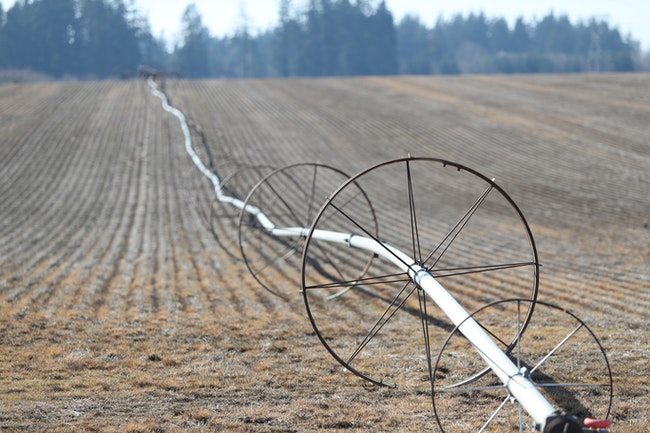 An irrigation system in an agricultural field off of 76th Avenue Northeast on Friday, March 12, 2021. (Amanda Loman/Salem Reporter)
An irrigation system in an agricultural field off of 76th Avenue Northeast on Friday, March 12, 2021. (Amanda Loman/Salem Reporter)
An Oregon Health & Science University report released Wednesday found Oregon farmworkers are often made to work overtime without additional compensation, leading to financial strain and taking a toll on workers’ physical and mental wellbeing.
Reyna Lopez, executive director of Oregon farmworker union PCUN, said they asked OHSU in early 2021 to gather existing data and research on occupational health conditions for farmworkers and the impacts of their wage structure and mandated overtime work with no additional pay.
PCUN leaders at the time were trying to get legislation passed that would have created overtime requirements for agricultural employers. “We realized that we really needed to have more research to really back up a lot of the anecdotes that we were hearing in the community,” she said.
Lopez wasn’t surprised by the findings of the report, which she said confirmed the experiences farmworkers have shared with PCUN since it was founded in 1985.
The report found farmworkers who work long hours face greater risks than the general population of physical harm, mental health issues and disrupted family functioning.
As a daughter of farmworkers, she said the findings hit close to home.
“I didn’t see my parents very much growing up, so some of those points made a lot of sense,” she said. “(I remember) spending very little time with them and the effects that had on our family and our relationship, so I think more than anything, it was reaffirming.”
The report cited a national study of 790,000 migratory and seasonal agricultural workers and dependents that found 80% of them earned family incomes below the federal poverty line. It also said farmworkers report a median household income of about $24,999, less than half of the general population’s $54,000.
State Bureau of Labor and Industries rules require most Oregon employers to pay employees overtime when they work more than 40 hours per week, but most agricultural workers are exempt from that. On Nov. 30, the Oregon Law Center filed a legal challenge in the state Court of Appeals on behalf of two Oregon farmworkers and Salem nonprofit Mano a Mano Family Center to challenge the current BOLI rules that exclude agricultural workers from getting overtime pay.
In a statement Dec. 1, a coalition of Oregon agricultural employer groups said the petition would undermine work being done in a legislative workgroup that’s discussing overtime pay for agricultural workers. The issue is complex due to the nature of Oregon’s agricultural economy, the needs of employees and the seasonal nature of their work, said the statement, which was signed by 10 agricultural organizations including the Oregon Farm Bureau Federation, Oregon Association of Nurseries and Oregon Winegrowers Association.
“Systematic and environmental barriers have perpetuated a culture of poverty and hazardous exposures that have significantly impacted workers’ short- and long-term wellness, creating a significant strain on the U.S. economy,” the OHSU report said.
The report said adopting overtime pay regulations for farmworkers in Oregon “would be a step in the right direction,” but more work would be needed to get to an equitable solution for protecting their health and safety.
Farmworkers should get overtime pay equal to all other “essential occupations,” the report said, and be guaranteed at least minimum wage during their normal work hours.
The report also said farmworkers being exposed to dangers like harmful chemicals, airborne organic dust and ammonia put them at greater risk than the general population of developing chronic respiratory diseases, skin disorders and hearing loss. They are at higher risk of developing chronic musculoskeletal pain, and working more than eight hours a day increases the risk of neck, back and knee pain.
A study in Oregon of 3,382 Latino farm workers found that working for more than 10 years in the field more than doubled their risk of obesity and increased their risk of high blood pressure by 1.72 times, according to the report.
Lopez said she has many aunts and uncles who suffer from high blood pressure and diabetes, many who walk around with a limp and several who have lost limbs working with heavy equipment at processing plants in agricultural fields.
The report also pointed to a study of migrant workers in Michigan, which found workers spent an average of one hour per week together as a family, while other low-income, working families spent 37 hours together on average.
The Washington Legislature recently signed into law an overtime rule for agricultural workers, where the number of weekly hours required to work for overtime pay would drop over the next three years.
Lopez said it’s inevitable that Oregon will soon have overtime pay regulations for agricultural workers, the overwhelming majority of whom are migrant workers from Mexico and Central America.
For farmworkers, she said having the option of overtime pay would make the difference of being able to afford waterproof work shoes for the winter and Christmas gifts for their children.
“At the end of the day, this is really about equity and about making sure that farmworkers are acknowledged and treated like other workers, other industries in Oregon,” Lopez said.
Correction: this story was updated to reflect that farmworkers being exposed to ammonia puts them at risk, not pneumonia. Salem Reporter regrets the error.
Contact reporter Ardeshir Tabrizian: [email protected] or 503-929-3053.
JUST THE FACTS, FOR SALEM – We report on your community with care and depth, fairness and accuracy. Get local news that matters to you. Subscribe to Salem Reporter starting at $5 a month. Click I want to subscribe!









